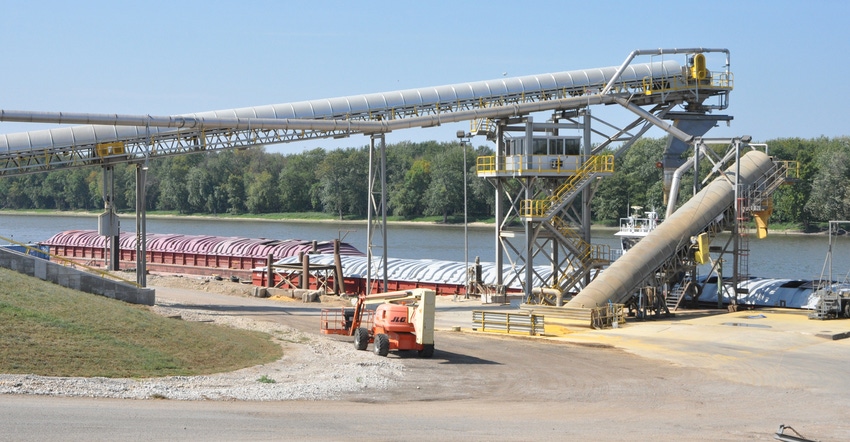
One of the largest ethanol refiners in Illinois is canceling plans for an expansion in Scott County near Jacksonville.
In a statement, Marquis Energy CEO Marc Marquis says the company decided to shelve the project in response to rising “anti-business” pressures in Illinois and a poor outlook for ethanol demand.
At its two existing facilities in Illinois and Wisconsin, Marquis produces more than 500 million gallons of ethanol each year. The canceled facility would have added to that volume with a $500 million investment.
“Illinois government’s anti-business and high-tax policies will require us to pursue company expansions in surrounding states,” Marquis says, citing Senate Bill 1407, which would require construction contractors at refineries to be paid a prevailing wage if it passes by the end of May. Because contractors currently aren’t unionized at many of Illinois’ 14 ethanol refineries, labor costs are expected to rise if the bill passes without an amendment.
Alicia Martin, president of the Associated Builders and Contractors of Illinois, says some members of the Illinois Senate have joined her group in opposing S.B. 1407 unless it’s brought to the floor with an exemption for contracting companies that employ graduates of workforce development programs like ABC’s Community Builders Program.
The association’s program is a free, 12-week course geared to helping individuals with barriers to employment develop high-paying skills. ABC then provides career placements with construction firms such as Manhattan Mechanical in Manhattan, Ill., which does construction work for several refineries.
Like all of ABC’s member-contractors, Manhattan Mechanical is a merit shop construction company (non-union). Martin says the Community Builders Program placements start working at $18 an hour, with “nowhere to go but up.”
“Forcing prevailing wage on contracting groups is going to cut entry-level positions because they’ll cost more to employ,” she says. “There’s no way you can afford to pay someone in an entry-level position that hourly rate of pay. You’d instead focus on the more experienced.”
When refineries like BP Whiting in Indiana shut down for repairs, they call in craftspeople from surrounding states to make up a large enough specialized workforce — sometimes on the order of 4,000-plus people.
April Fowlkes from Aurora, Ill., has worked in Whiting and at other locations around the Midwest for the past three years through her job with Manhattan Mechanical. A graduate of the Community Builders Program, she says she’s already had five promotions and raises, bringing her into the six-figure range.
“I didn’t know anybody coming in here. I just came in and worked really hard, and somebody said, ‘I see that person right there; let’s give her a shot.’ So here I am, still making it happen,” Fowlkes says, adding that when she first attempted to break into construction by joining the Local 150, no one ever got back to her after she paid the fee.
“One thing’s for sure — Manhattan Mechanical has plenty of work,” Fowlkes says. “I don’t have to worry about getting rained out and sent home, as opposed to what the union guys have to go through. I haven’t ever been sent home in three years, so I think I made the right choice.”
Headwinds for ethanol
Domestic demand for gasoline is tightly tied to ethanol use. And the past two years of flat E10 consumption show demand in the U.S. is going downhill, not up, thanks to more fuel-efficient vehicles and piecemeal electric vehicle adoption, says University of Illinois agricultural economist Scott Irwin.
“If you’re stuck at 10% blends and you have a 26 billion-gallon decline in gasoline consumption, 2.6 billion gallons of that decline will be felt in the ethanol market,” Irwin says, adding that consumption is anticipated to fall that much by 2030 in government projections. “There’s still a lot of uncertainty in projecting gasoline use a decade out, but the message is, it’s declining.”
Irwin says ethanol’s only hope to grow as an industry is through more Americans driving with E15 rather than E10 fuel. However, while the blending economics of ethanol in 10% blends make it cost-competitive against fossil fuel-sourced aromatics used to increase octane, an extra 5% ethanol only increases octane by 1% — not enough to bump the fuel to a high enough octane to fetch a higher premium at the gas pump.
“That long-term outlook combined with the poor margins of the last 18 months makes it a pretty easy investment decision to look elsewhere when it comes to investing in ethanol,” Irwin concludes. “One way or another, it’s crucial for the ethanol industry to develop E15. That’s their only hope for expansion over the next decade.”
About the Author(s)
You May Also Like




